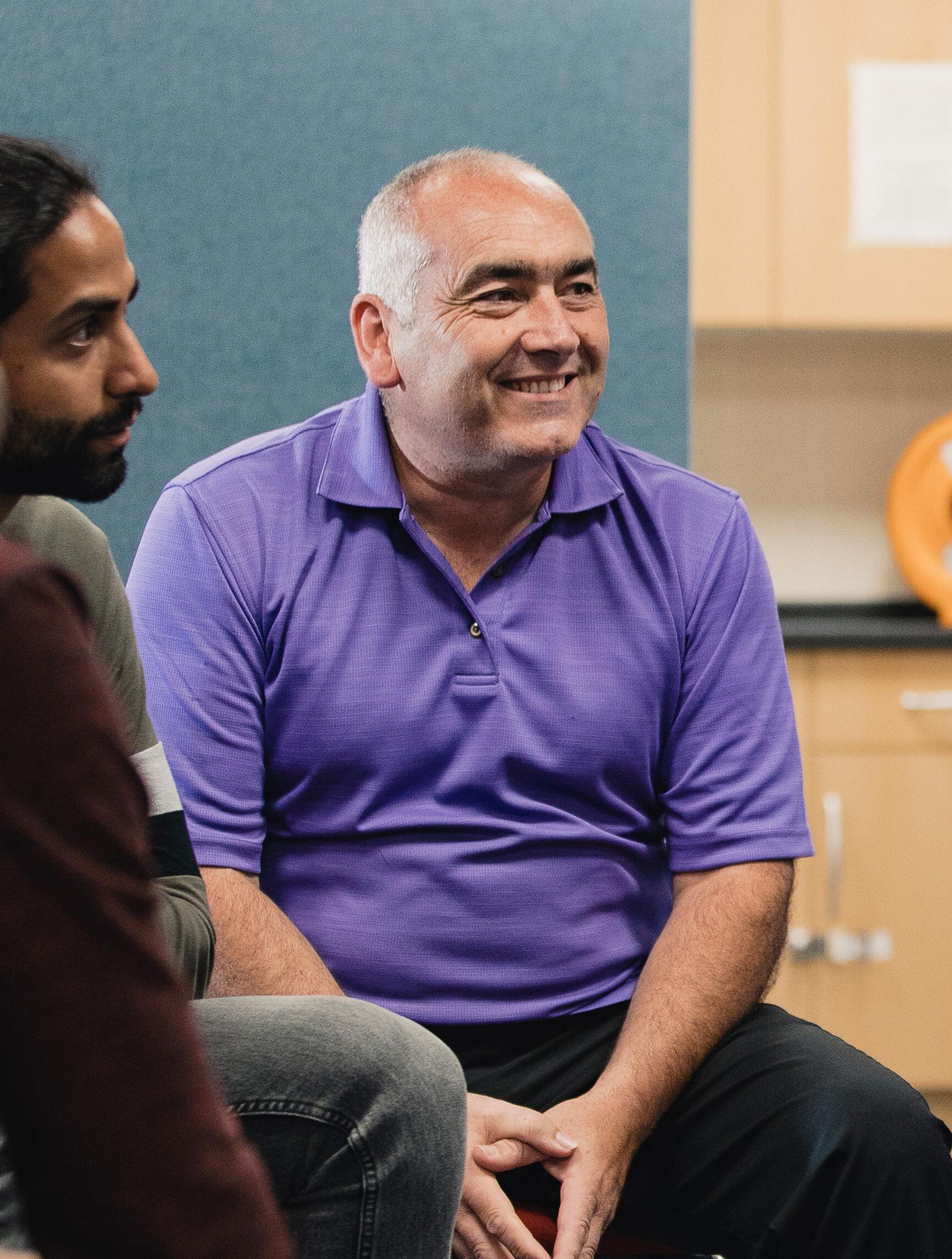

MEN'S HEALTH
plus articles on diabetes, weight management and loneliness
In this issue of Your Health, we take a look at men's health and the different issues men may face in their lives – with advice and support resources to help. In addition, we have an article on type 2 diabetes and how positive lifestyle changes can reduce our risks greatly. And finally, we cover the topic of loneliness as we approach Loneliness Awareness Week (June 10-16th), looking at the different forms and effects of loneliness and the actions you can take for yourself and others.
MEN: Taking Care of You
Evidence suggests that men are less likely to seek support for their health than women, although they tend seek more help after retirement age. This is despite the life expectancy for men being lower than that of women, in part related to biological, social and occupational tendencies/trends.
Men should feel able to seek support from their GP or other clinician as soon they need it, just like anybody else. Identifying problems sooner rather than later means they are caught early and are, therefore, usually more easily and quickly treated. Delay in seeking support could result in more serious symptoms, additional complications and more challenging treatment.
Let’s take a look at some of the issues men may face.
Sexual health
Most men will experience some form of sexual health problem at some stage in their lifetime, whether this be acute or chronic.
Erectile dysfunction is more common with age and is often easily treatable.

There are various possible underlying causes for erectile dysfunction such as cardiovascular (heart) disease, diabetes, certain medications or other underlying health conditions or treatments. Additionally, psychological symptoms associated with stress, depression and anxiety can result in erectile dysfunction. It’s important you speak to your GP to try and identify any potential causes. This can help them to provide appropriate treatment options.
There are prescription medications available, and your GP can refer you for specialist treatment and support if needed. Lifestyle changes may also help such as

stopping smoking, cutting down alcohol and losing weight if needed.
Sexually transmitted infections (STIs) may or may not show symptoms. Symptoms may include: Discharge from the penis; Pain on urination; Rash/lump/blisters in the genital region; Pain in the testicles.
It’s important to seek support from a sexual health clinic or your GP if you suspect you may have an STI as treatment may be required. Practicing safe sex, and getting regular sexual health assessments if you
are sexually active with more than one individual, can all help with avoiding STIs.
Other common sexual health problems experienced by men include: Premature ejaculation; Difficulty/lack of ejaculation; Loss of libido.
If you have any concerns about your sexual health, seek support from your GP as soon as possible. It can be embarrassing to discuss such concerns, but your GP will have seen many men with similar problems, many times previously and will be able to offer advice.
Health
Prostate health
The prostate is a walnut-sized gland. Its function is to produce fluid, which mixes with sperm during ejaculation to create semen. Prostate function is governed by the male hormone, testosterone. The prostate gland sits between the bladder and the penis. The urethra (the tube that carries urine from the bladder to the penis) passes through the prostate gland.
The most common symptoms experienced relating to prostate health are related to urination and can include:
Not being able to urinate or difficulty doing so such as straining or delay; Poor urinary flow;
Increased frequency or urgency to urinate, particularly during the night; Leaking following urination; A feeling like the bladder has not been emptied fully; Pain on urination.
These symptoms are most commonly due to an enlarged prostate (commonly caused by benign prostatic hyperplasia (BPH) – a non-cancerous growth of cells) and can be easily managed with lifestyle changes, medications if required or occasionally surgery if this is deemed necessary.
However, other causes can also include prostatitis (inflammation or infection of the prostate gland) or prostate cancer, so it’s important to seek advice from your GP as soon as possible, if you develop any symptoms.
Prostate cancer is the most common cancer in UK males (27% of all new cancer cases) and second-most common cause of cancer death. Prostate cancer is easily treatable, especially if caught early.
Although survival rates have never been better, the UK still experiences 12,000 deaths per year as a result of prostate cancer. The causes of prostate cancer are not fully understood but, the risk increases


“It's important you check regularly for any changes to your testicles.”
with age, is uncommon in men aged under 50, and is more common if you have a father or brother with prostate cancer or are a Black man.
Testicular health
It’s important you check regularly for any changes to your testicles. The ideal time to check is just after a warm bath or shower: hold your scrotum in the palm of your hand and check each testicle by rolling it between the thumb and fingers.
It’s perfectly normal for testicles to be a different size and length; however, if you notice any changes such as swelling, lumps, hardening or pain, it’s important you seek the advice of your GP as soon as possible. These symptoms are commonly a sign of infection, inflammation, fluid buildup (hydrocele) or damage; however, it is important to get checked as these symptoms may also indicate testicular cancer.
Although cancer of the testicles is one of the less common cancers, it is the most common cancer found in men aged 15 to 49. 2,354 men are diagnosed in the UK each year. Many testicular cancers can be cured if treated early, so it is important to check regularly and don’t delay seeking GP advice.
Mental health
Research indicates that men are often reluctant to discuss their emotional wellbeing openly, likely influenced by societal and gender norms that discourage such openness.
The message 'It's OK not to be OK' has gained traction recently – and it's crucial for men to understand that expressing vulnerability and seeking help should be met without judgement or altered perceptions.
While discussing these issues can be challenging, the heightened risk of suicide and other damaging behaviours like addiction underscores the importance of reaching out for support.
If you're experiencing symptoms that affect your mental health, talking to a GP can be a helpful first step. Sharing your feelings with family and friends can also provide crucial support.
Lifestyle adjustments such as a balanced diet, regular exercise, time spent outdoors, proper sleep habits, work-life balance and mindfulness can significantly improve wellbeing.
Beyond self-care, it is vital to support others. If you notice someone who may be struggling, offer to listen, encourage them to speak up and reassure them that support is available and that they're not alone.
Signs of declining mental health in men can include:
Persistently low mood or heightened anxiety;
Irritability and anger; Increased risk-taking and aggression; Loss of motivation;
Fatigue, poor sleep or lethargy; Tearfulness;
Feelings of hopelessness, worthlessness or helplessness;
Suicidal thoughts or a desire to escape; Guilt, shame and low self-esteem; Apathy and loss of interest in previously enjoyed activities.

“Sharing your feelings with family and friends can provide crucial support.”
Initiating a conversation about someone's mental health can be incredibly beneficial, potentially offering a much-needed opportunity for them to express their struggles.
If you believe someone is at immediate risk of harm, such as expressing suicidal plans or intentions, it's critical to stay with them, remove any means of selfharm where possible and seek immediate assistance, whether by contacting their GP, calling emergency services or taking them to A&E.

If you're supporting someone with suicidal feelings, it can also be emotionally taxing, so ensure you seek support for yourself if needed.
Please note: When we use the word ‘men’, we are referring to men, trans women, people who are non-binary who were assigned male at birth and cis gender men. When we use the word ‘women’, we are referring to women, trans men, people who are non-binary who were assigned female at birth and cis gender women.
Sources:
Diabetes UK, Cancer Research, NHS, Prostate Cancer UK, Men’s Health Forum, Drink Aware, ONS, Mental Health Forum
SOME SOBERING FACTS:
One in eight men suffer from mental health issues; Men are three times more likely to die by suicide than women; The highest suicide rates in the UK are among men aged 40 to 49, with men accounting for three-quarters of suicide cases; Men are less likely to seek out psychological therapies, with only 36% of NHS talking therapy referrals being for men; Men are more prone to homelessness, substance dependency and frequent drug use; Men have a higher tendency towards alcohol addiction and deteriorating mental health can trigger harmful behaviours, potentially leading to addiction.
Diabetes
Diabetes is a serious condition characterised by high blood sugar. Its full name is diabetes mellitus.
There are different types of diabetes mellitus, and they have one thing in common: the body’s diminished ability to action insulin correctly.
Insulin is a hormone produced in the body by the pancreas. It promotes the absorption of glucose (sugar) from the blood into the liver, fat and skeletal muscle cells. When the action of insulin is diminished, the sugar remains in the blood and this can be dangerous to health.
Diminished insulin action can result from: Decreased insulin secretion; Reduction in the effectiveness of secreted insulin (insulin resistance); A combination of the above.
Types of diabetes mellitus
Diabetes can be divided into primary and secondary. Most patients have primary diabetes – you may have heard of the common primary diabetic syndromes: type 1 and type 2 diabetes.
Type 1 is characterised by insulin deficiency. Injected insulin is needed to replace the deficiency. It is therefore known as insulin-dependent diabetes mellitus (IDDM).
Type 2 is characterised by insulin resistance. It can usually be treated with dietary changes in isolation or combined with medication, without the requirement for insulin. It is therefore known as noninsulin-dependent diabetes mellitus (NIDDM).
Sometimes however, it can be difficult to achieve adequate control of type 2 diabetes with oral medication alone and insulin treatment can be needed. This is known as insulin-treated type 2 diabetes.
A minority of patients have secondary diabetes due to another disease that interferes with the action of insulin.

You may also have heard of prediabetes. This is a term used to describe people who are at high risk of type 2 diabetes. It means that your blood sugars are higher than usual, but not high enough for you to be diagnosed with type 2 diabetes. At this stage, for many, there may be an opportunity to completely reverse the diabetes.
Prevalence across diabetes types
The number of people with diabetes is increasing at an alarming rate and we are

fast approaching epidemic proportions globally – a major public health problem.
Type 2 diabetes has grown at a particularly high rate and is now one of the world’s most common long-term health conditions.
Most cases are linked to increased obesity. In the UK, type 2 diabetes accounts for about 90% of all diabetes, 8% with type 1 and 2% with rarer types. Approximately 4.3 million people are living with a diabetes diagnosis in the UK, with another 850,000 undiagnosed.
What is the risk of developing diabetes?
Type 1 diabetes cannot be prevented and there is no way to predict who will get it. It can appear at any time in someone’s life after the destruction of the pancreas cells, which produce insulin.
It is often not clear why these cells are damaged, although it is thought to have been triggered by infection. The risk of developing type 2 diabetes can be reduced by changing lifestyles.
Risk factors for type 2 diabetes:
Age: Your risk increases with age: you are more at risk if you are over 40 and white or over 25 and African-Caribbean, BlackAfrican or South Asian;
Family history: You are two to six times more at risk if you have a parent, sibling or child with diabetes;
Ethnicity: Type 2 diabetes is two to four times more likely in people of South Asian, African-Caribbean or Black-African descent;
Weight: The more you weigh the greater your risk, especially if you are large around the middle;
Other factors including high blood pressure, smoking, a history of diabetes during pregnancy, polycystic ovary syndrome, mental health conditions, e.g. schizophrenia, bipolar disorder or depression, sedentary lifestyle, increased alcohol intake and poor sleep.
What are the signs and symptoms of diabetes?
Having signs or symptoms of diabetes does not mean you definitely have it, but you should always contact your GP, just to make sure.
Common symptoms are:
Going to the toilet a lot, especially at night; Being really thirsty; Feeling more tired than usual; Losing weight without trying; Genital itching or thrush; Cuts and wounds take longer to heal; Blurred vision.
Many people have type 2 diabetes without realising. This is because symptoms do not necessarily make you feel unwell.
The symptoms for type 1 or type 2 diabetes are similar. However, it is hard to ignore the symptoms of type 1 diabetes as they come on rapidly. The patient will feel very unwell and, if left untreated, will develop a condition called diabetic ketoacidosis, when the blood sugar levels are dangerously high, which can result in a potentially fatal coma.
Type 2 diabetes can be easier to miss as it develops more slowly, especially in the early stages.
Complications of diabetes
With good diabetes control and a healthy and active lifestyle, it is possible for people to go for a number of decades complication free. Keeping your blood sugar, blood pressure and blood fats (cholesterol) under control will hugely help to reduce your risk of developing complications.
However, if you have had less-wellcontrolled diabetes, have led a less healthy lifestyle or had undiagnosed diabetes for a number of years, the complications of diabetes are more likely to develop earlier. Uncontrolled diabetes can lead to shortand long-term health complications.
Whilst there is no cure for diabetes, the strongest evidence for reducing your risk of type 2 diabetes is to ensure that your blood sugar stays within a safe range as much
The short-term/acute complications include:
Hypoglycaemia: when the blood sugars are too low;
Hyperglycaemia: when the blood sugars are too high;
Hyperosmolar hypoglycaemic state (HHS): a life-threatening emergency that only happens in people with type 2 diabetes, brought on by severe dehydration and very high blood sugars; Diabetic ketoacidosis (DKA): a lifethreatening emergency caused by a lack of insulin and high blood sugars.
“With good diabetes control and a healthy, active lifestyle, it's possible for people to go complication-free.”
Long-term/chronic complications include: Eye problems; Foot problems; Heart disease and stroke; Kidney problems; Nerve damage; Mouth problems; Sexual problems; Other related conditions like cancer.
Reducing the risks of/reversing type 2 diabetes: Eat well; Move more; Lose weight.


as possible. It is usually possible to reverse prediabetes – whilst for established type 2 diabetes, remission may be achieved. If you have type 2 diabetes, some people can work towards pushing the condition into remission with the measures below.
Weight management and diabetes
Weight loss can be achieved through lifestyle and diet changes, but for some, weight loss surgery, called bariatric surgery may be necessary. Losing around 15kg significantly increases your chances of type 2 diabetes remission.
Remission means that the diabetes has not gone for good, but that blood sugar levels are now within a normal range as a result of the weight loss. However, your GP should continue to monitor you.
There is no such thing as a special diet exclusively for people with diabetes, as there is no one-size-fits-all diet. The diet should however be nutritious, understanding how different carbohydrates impact on blood sugar and include foods with a lower glycaemic index which can help to maintain healthy blood sugar levels.
Losing extra weight can lead to: Fewer medications; Better blood sugar levels; A lower risk of diabetic complications; Improved blood pressure; Improvement of other health parameters, e.g. musculoskeletal, cardiovascular and psychological health issues.
To prevent the complications of diabetes, it is important you keep your blood sugars, blood pressure and cholesterol levels as close as you can to the numbers your doctor recommends. Do not smoke, be physically active and eat a nutritious diet to help you reach or maintain a healthy weight.
Sources:
NHS, Diabetes UK, NCBI, International Diabetes Federation
Loneliness Awareness
Many of us will experience loneliness at some stage in our lives. Research indicates that individual traits, social and structural factors and particular life events may increase the risk of feeling lonely.
Loneliness is defined as ‘a subjective, unwelcome feeling of lack or loss of companionship. It happens when there is a mismatch between the quantity and quality of the social relationships that we have and those that we want.’
There are several forms of loneliness, with the three most commonly recognised being:
Emotional loneliness, which is the lack of meaningful personal relationships;
Social loneliness, which is a perceived lack in the quality of one's social connections;
Existential loneliness, which is a profound sense of isolation from others and the world.
Other forms include transient loneliness that ebbs and flows, situational loneliness that arises at specific times like holidays or
The effects of loneliness:
Loneliness can lead to a 26% increase in the risk of premature death; It is linked to a higher likelihood of poor mental health, including depression; Studies suggest a strong relationship between mental wellbeing and loneliness, with 60% of those chronically lonely experiencing mental distress versus 15% of those not lonely; 62% of young people who feel lonely report a loss of self-confidence; Loneliness is connected to higher blood pressure and stress responses; Poor sleep quality is often associated with loneliness in young adults and the general population reports inadequate and unsatisfying sleep.

Loneliness can also affect educational and professional engagement:
Loneliness in early adolescence can correlate with lower educational success;
48% of lonely young people feel less motivated to advance in their career; Higher levels of loneliness among employees are associated with subpar work performance;
Severe loneliness has an estimated cost of about £9,900 per person annually due to its effects on wellbeing, health and job productivity;
It's estimated that loneliness costs UK employers approximately £2.5 billion annually, impacting employee health, productivity and turnover.

Plan activities that bring you joy, including hobbies or creative pursuits; Spend regular time outdoors to boost your mood and feel more connected to your environment; Prioritise self-care through healthy eating, staying active and maintaining good sleep hygiene; Focus on the positives in life, reflecting on happy memories and things you're grateful for, to foster a more positive outlook.
The Campaign to End Loneliness has some great videos to get you on your way –
Let’s Talk Together More Be More Us
Sources: weekends and chronic loneliness where the feeling is persistent.
What you can do to help yourself if you are lonely:
Reach out to friends by phone or social media; initiating contact can be pleasantly surprising; Invest time in forging new connections by joining local groups or classes or through volunteering;
Engage in small talk with neighbours or others you encounter; these interactions can help you feel more connected; Use technology to maintain existing relationships and develop new ones, with many resources available to improve digital skills; Share your feelings and learn positive coping strategies through speaking with someone, which can be accessed via your GP or community organisations; Discover local support, such as community hubs, connectors or social prescribers, which your GP can help you access;
Campaign to End Loneliness, ONS, "Personal Relationships: Personal Relationships in Disorder" (Steve Duck, Robin Gilmour; 1981)
NEXT ISSUE:
Travel Health
Sun and Melanoma Awareness Self-Care
At Health Partners we offer a full range of tailored health and wellbeing services.
Our thinking is innovative. We constantly develop new responses and tools designed to address the health and wellbeing challenges that face your business and people.
Our commitment is total. We invest in our services, creating new ones and keeping in step with every client. We constantly explore new ways of working and make no compromises in the quality of our services.
Simply put, we are here to help people be their best.
